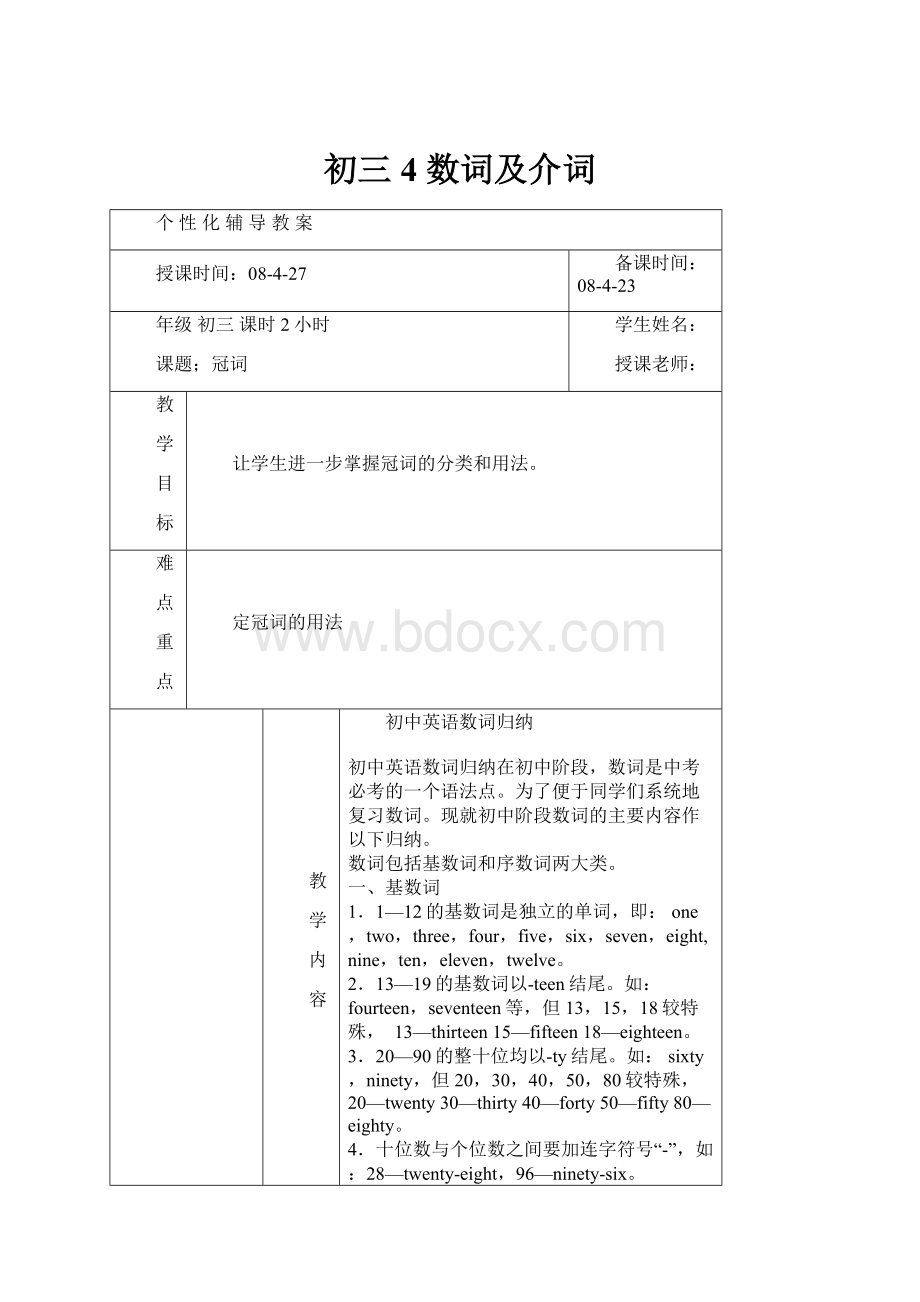初三4数词及介词.docx
《初三4数词及介词.docx》由会员分享,可在线阅读,更多相关《初三4数词及介词.docx(18页珍藏版)》请在冰豆网上搜索。

初三4数词及介词
个性化辅导教案
授课时间:
08-4-27
备课时间:
08-4-23
年级初三课时2小时
课题;冠词
学生姓名:
授课老师:
教
学
目
标
让学生进一步掌握冠词的分类和用法。
难
点
重
点
定冠词的用法
教
学
内
容
初中英语数词归纳
初中英语数词归纳在初中阶段,数词是中考必考的一个语法点。
为了便于同学们系统地复习数词。
现就初中阶段数词的主要内容作以下归纳。
数词包括基数词和序数词两大类。
一、基数词
1.1—12的基数词是独立的单词,即:
one,two,three,four,five,six,seven,eight,nine,ten,eleven,twelve。
2.13—19的基数词以-teen结尾。
如:
fourteen,seventeen等,但13,15,18较特殊,13—thirteen15—fifteen18—eighteen。
3.20—90的整十位均以-ty结尾。
如:
sixty,ninety,但20,30,40,50,80较特殊,20—twenty30—thirty40—forty50—fifty80—eighty。
4.十位数与个位数之间要加连字符号“-”,如:
28—twenty-eight,96—ninety-six。
5.百位和十位(若无十位则和个位)之间加and,如:
148—onehundredandforty-eight406—fourhundredandsix。
6.hundred(百),thousand(千),million(百万),billion(十亿)等前面即使有具体的数词,也不能在它们的后面加s。
如:
600—sixhundred,8百万—eightmillion。
7.1000以上的数字,从后往前数每三位加一个逗号“,”第一个逗号前为千(thousand),第二个逗号前为百万(million),第三个逗号前为billion(十亿)。
英语中无“万”这个词,我们可以用“几十个千(thousand)”表示几万,“几百个千(thousand)”表示“几十万”。
如:
2,510=twothousandfivehundredandten;84,296=eight-fourthousandtwohundredandninety-six;274,350=twohundredandseventy-fourthousandthreehundredandfifty。
8.hundred,thousand,million用复数形式修饰名词时要用“of+复数名词”,如:
数以百计的年轻人hundredsofyoungpeople;数以千计的书thousandsofbooks。
注意:
hundredsof/thousandsof/millionsof+复数名词,其前面不能加具体的数词,但可加several或many。
9.基数词+单数名词+形容词构成合成形容词。
如:
一个五岁的男孩afive-year-oldboy;一座800米长的桥an800-metre-longbridge;女子400米接力girls`400-metrerelayrace。
10.句型:
主语+is+about(大约)/over=morethan(超过)/nearly(接近)+具体数词+metre(s)/kilometre(s)/kilo(s)long/high/tall/deep/away等。
如:
长江长6300公里。
TheChangjiangRiveris6,300kilometreslong.
二、序数词
1.基数词变序数词可利用口诀巧记:
“一、二、三,特殊记,八去“t”,九去“e”,“ve”要用“f”替,见“y”变成“i”和“e”,词尾加上“th”,若是遇到几十几,只变个位就可以。
”第一、第二、第三分别:
first,second,third,eight—eighthnine—ninth,five—fifth,twelve—twelfth,twen-ty—twentieth,forty—fortieth,twenty-five—twenty-fifth。
2.其余情况均在基数词后加th。
如:
six—sixth, nineteen—nineteenth, hundred—hundredth,thousand—thousandth等。
三、数词的应用
1.钟点的表示:
小时、点钟、分钟、秒钟要用基数词。
①“几点钟”用基数词加o`clock。
o`clock可省略。
如:
现在是5点钟—It`sfive(o`clock).②“几点过几分,≤30分钟”用介词past。
如:
7:
05—fivepastseven;7:
15—fifteen(aquar-ter)pastseven;7:
30—halfpastseven。
③“差几分几点”用介词“to”。
注意:
整点加“1”且用60减去目前的分钟数。
如:
7:
40—twentytoeight;7:
45—fifteen(aquarter)toeight。
④日常生活中的时间读法常常简化,直接按基数词的顺序读。
如:
7:
05—sevenofive;7:
15—sevenfifteen。
1.编号的表示:
①LessonOne=thefirstlesson第一课;②BusNo.3=theNo.3bus
2.3路公共汽车;③表示住所时不用“No.”如:
302房间—Room302(读作:
roomthreeotwo);④如果编号的数词比较长,一般用基数词。
如:
Page457第457页;⑤电话号码,用基数词,可单个读,重复的数字也可读“double”,如:
3855633—threeeightfivefive(doublefive)sixthreethree(doublethree)。
3.年月日的表示:
①年份用基数词,先读前一位或两位,再读后两位。
如:
1999—nine-teenninety-nine;1900—nineteenhundred;2000—twothousand;1905—nineteenofive;②年用基数词,日用序数词。
如:
1998年6月8日写作:
June8,1998;读作:
Junetheeighth,nineteenninety-eight或theeighthofJune,nineteenninety-eight。
4.分数的表达:
①分子用基数词,分母用序数词,分子大于“1”,分母则加“s”。
如:
1/3onethird,2/3twothirds;②1/2a(one)half,1/4onefourth或a(one)quarter,3/4threefourths或threequarters。
5.倍数的表达:
一倍用once,两倍用twice,两倍以上用基数词+times。
如:
5倍fivetimes。
四、特殊用法
1.数词作主语,谓语动词用单数。
如:
Twomonthsisquitealongtime.Fourandtwoissix.What`stwoandthree?
2.一个半小时(一年半,一个半月可类推)one/anhourandahalf=oneandahalfhours。
3.不定冠词用在序数词前表又一、再一。
如:
I`vetriedthreetimes,letmetryafourthtime.意为:
我已经试过三次,让我再试一次吧。
五、过关练习
运用数词方面的知识解答下列题:
1.Thereare _____(365)daysinayear.
2.Look!
Thereare_____(成千上万的)starsinthesky.
3._____(2/3)ofthestudentsaregirlsinourclass.
4.Septemberisthe_____ monthoftheyear.
5.Thereareforty-sixstudentsinClass_____(三班)
6.Decemberisthe _____andlastmonthoftheyear.
7.Annreceivedalotofpresentsonher_____birthday.Thetwelve-year-oldgirlfeltveryhappy.
8.Thereare _____studentsinourclass,twentyboysandtwentygirls.
9.Ourteacheroftentellsusthatworkmustcome_____ .
10.Atthebeginningofthe_____(twenty)century,theworld’spopulationwasabout1,700million.
介词
简单的说,
介词就介绍对象和句子其他部的关系的。
比如:
在,和,跟,从,除了,为了,关于,根据……等等
中学英语介词
常用的介词
about,above,across,after,against,around,at,
before,behind,below,beneath,beside,besides,between,beyond,by,
down,during,
except,
for,from,
in,inside,into,
like,
near,
of,off,on,out,outside,over,
since,
through,throughout,till,to,toward,
under,until,up,upon,
with,without,
accordingto,
becauseof,
bywayof,
inadditionto,
infrontof,
inplaceof,
inregardto,
inspiteof,
insteadof,
onaccountof,
outof.
常用的at,by,in,on四个词举例子啦
1.Inthesummerattheseaside(季节用in,在海边用at)
Onthecoastwelikeitfine(在海岸用on)
butinwinter,yes,atChristmas(在圣诞用at)
Bythefiresidewerecline(放置)(在炉边用by)
2.InJulywewenttoKenya(月份用in)
StayedinLamubythesea,(住在Lamu用in)
WecamebacktoTanzania
ThenacrossVictoriasea
3.Didyoucomehereinataxi?
(乘出租汽车用in)
Orbybus,oronthetrain?
(乘公共汽车用by,乘火车用on)
Didyoucomeonfootthisevening(步行用on)
Orperhapsbyaeroplane?
(乘飞机用by)
4.WillyoucometoteaonMonday?
(在星期一用on)
I′llbehomeathalfpastthree(时间三点半用at)
Yes,I′llstayforhalfanhour(长达半小时用for)
ifyoubuysomebeerforme(给我forme)
5.InthemorningIdrinkcoffee(早晨用inthemorning)
Intheafternoonthere′stea(下午用intheafternoon)
IntheeveningIhavecocoa(傍晚用intheevening)
Yes,atnight,it′sgoodforme.(晚上用atnight)
6.Where′smypencil?
Inthekitchen(厨房里inthekitchen)
Onthetablenearthechair(在桌上onthetable,在椅边nearthechair)
Underneaththecupandsaucer(在杯和碟的下面underneath...)
Justbehindtheteapotthere(在茶壶后边behind...)
7.Canyoutellmehowtogetto
Mr.Johnson′scoffee-bar?
Downthestreetandroundthecorner(downthestreet沿着街道,round...绕过)
Pastthechurchandthereyouare
8.Where′sthebookshop?
Overthere,dear(overthere那里)
Firstturnleft,thengostraighton,
Alongtheroad,acrossthemarket(沿着路alongtheroad,穿过市场across...)
It′sinfrontofyou,dearJohn(在你前面infrontofyou)
9.Thereisnothingontheradio(广播ontheradio)
"Songswithorchestra"theysaid.(with后orchestra为有形物,无形物则用by)
I′mnotinterestedinmusic(interestedin兴趣于)
soIthinkI′llgotobed
10.InamomentI′llbefinished(inamoment片刻里)
Withtheseprepositions-so
IwillsaytoyouinEnglish
tillthenexttime,cheerio(加油呀)(till...直到)
以下是较为详细的
一、介词at,in,on,by表示地方、地点、位置:
(1).at把地方、地点、位置当作一个“点”:
1.Thebeggerissittingatthecorner.那乞丐坐在角落里。
2.Janeiswaitingforyouatthebusstop.Jane在巴士站等你。
3.athome在家
4.Who'sstandingthereatthedoor?
谁站在门口?
5.atthetopofthepage在一页的上面
6.Theshopisattheendoftheroad.那商店就在路的尾端。
7.attheentrance在进口处
8.atthecrossroads在十字路口
9.Whenwillyouarriveattheoffice?
你什么时候会到公司呢?
10.I'minFrance,atParis.我住在法国巴黎。
(相对法国来讲,巴黎只是一个
“点”)
11.Thereisasmallhutatthefootofthehill.山脚下有一座小屋子。
12.Myauntlivesat55BoretzRoadinDurham.
我的姑妈住在Durham,Boretz路门牌55号。
(地址要用at,不能用in)
13.attheside在一边
14.atreception在招待会上
15.I'matwork.我在工作。
16.atclass/home/thelibrary/theoffice/school在班上/家里/图书馆/公
司/学校
(2).in把地方、地点、位置当作一个范围或一个封闭的空间:
1.IliveinLondon.我住在伦敦。
(大城市用in)
2.IliveinEngland,atLondon.我住在英国伦敦。
(England大过London喔)
3.Iliveinabigcity,mysisterlivesatasmalltown.我住在大城市,我
姐姐住在一个小市镇。
(如果把city看做一个圆圈,smalltown就成一个点。
因此就in
acity,atasmalltown.呵呵)
4.WehaveameetinginBeijing.我们有北京有一个会议。
5.MarsisintheSolarSystem.火星在太阳系里。
6.inacar乘汽车(不是onacar也不是byacar喔)
7.inataxi乘的士(不是onataxi或byataxi)
8.inahelicopter乘直升机
9.inaboat乘小船
10.inalift(elevator)乘电梯(电梯像个笼子,当然要用in啦)
11.inthenewspaper在报上
12.inthesky在空中
13.inthebed在床上(也可用onthebed)
14.inthebedroom/class/library/school在寝室/课室/图书馆/学校
(3).on把地方、地点、位置当作一个平面:
1.Theauthor'snameisonthecoverofthebook.在书的封面上有作者的名
字。
2.Therearenopricesonthismenu.在这菜单上没有价钱。
3.Youarestandingonmyfoot.你踏到我的脚了。
4.Therewasa"nosmoking"signonthewall.在那墙上有个“不准吸烟”的牌
子。
5.Iliveonthe7thfloorat21OxfordStreetinLondon.我住在伦敦牛津街
21号八楼。
(7thfloor就是八楼;注意句中的on,at,in的用法)
6.onabus乘巴士(不是inabus喔)
7.onatrain乘火车(可想像“骑”在火车上,哈哈)
8.onaplane乘飞机(可想像“骑”在飞机上)
9.onaship乘轮船
10.onabicycle,onamotorbike骑自行车/摩托车
11.onahorse,onanelephant骑马/象
12.ontheradio,ontelevision听广播、看电视
13.ontheleft,ontheright在左边、在右边
14.ontheway在路上
15.onthebed在床上(也可用inthebed)
16.ontheceiling在天花板上
17.onthefloor在地板上
(4).by用在表示位置(有在旁、贴近、靠近之意):
1.bythefire在炉边
2.bytheseaside在海边
3.apathbytheriver沿河道路
4.bythenearestroad走近路
二at,in,on,by用来表示时间
(1).at(在、于)用指明一特定的时间、节日、年龄:
1.atdawn/atnight/atnoon/atmidnight/atdaybreak
在黎明/在夜里/在中午/在午夜/在日出时
2.Igotoschoolatseveninthemorning.(atseven)我早上七点钟去上学。
3.athalfpastfive(五点过半小时)在五点半
4.ataquartertoseven(过四分之一小时就到七点)六点四十五分
5.Thetrainisdueat12.15p.m.(at12.15p.m.)
那班火车的到站时间是12点15分。
6.atmid-autumnfestival/atChristmas/atSpringFestival
在中秋节/在圣诞节/在春节
7.atforty在四十岁时
(2).in(在、在…之内、在…期间、在…后、过…后)
指明:
天、年、月、季节、周次:
1.inthemorning在早上(不可说atthemorining。
鬼才知道为什么不可用at,
大约因为at没有“在…期间”的意思吧)
2.intheafternoon在下午(在下午这段期间,呵呵,举一反三喔)
3.Shelikestoworkintheevening.(或inthenight)她喜欢在晚上工作。
4.inthedaytime在白天
5.in2002(2002可读作twothousandtwo)在2002年
6.He'stoquitinMay.(inMay)他在五月就辞职了。
7.HewenttoTokyoinJune2002.(inJune2002)他于2002年六月去东京。
8.inthesecondweekofJuly在七月份的第二周
9.It'stoocoldinwintertorunoutside.(inwinter)冬天里出外跑步是太
冷了。
10.intwomonths在两个月内
11.inthosedays在当时
(3).on(在…时、在(某日)、在某日早/午/晚、当…时候、和…同时、刚一…)指明:
日子、日期、星期加上早午晚
1.onthefirst在一号(指某